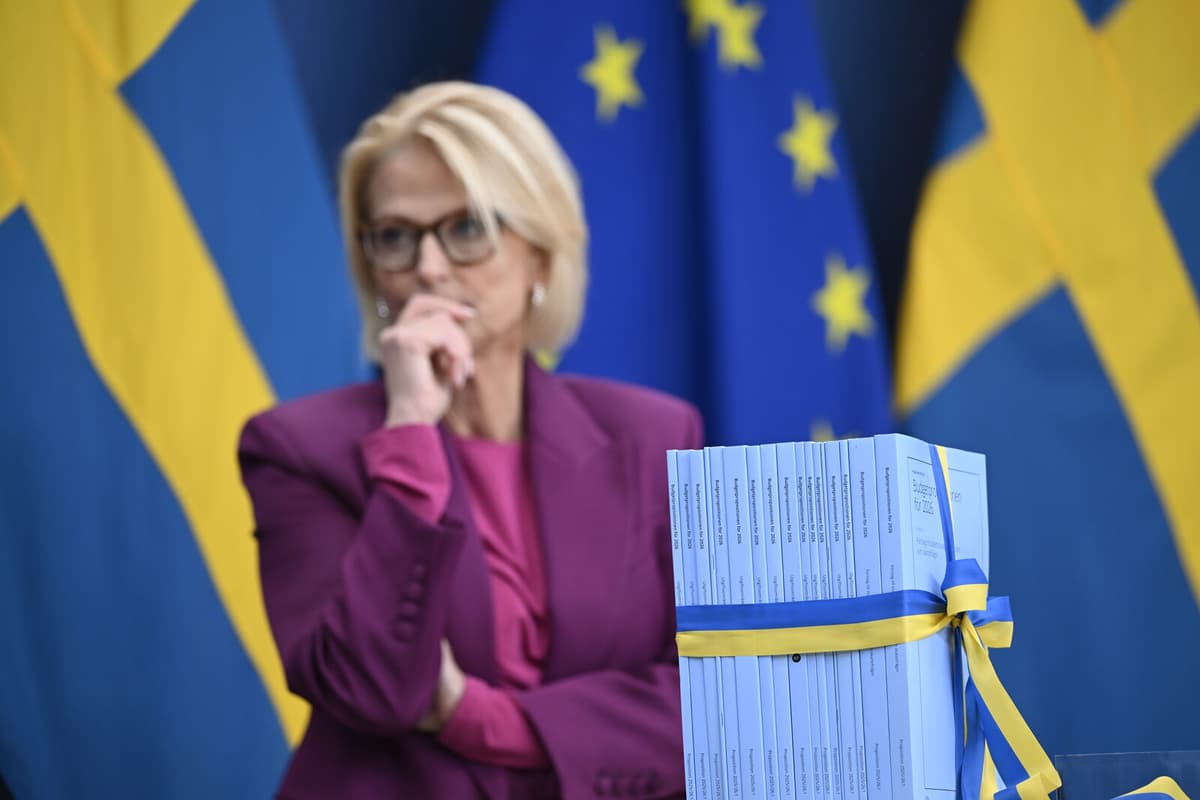Over half of the new initiatives of 80 billion kronor in the budget for 2026 will end up in households' wallets.
The opposition, which will present its budget motions in a couple of weeks, calls it election pork.
It will be interesting to see if they will put less in reform space. It remains to be seen what they think of doing instead, says Svantesson.
She explains the large initiative for households' wallets by saying that many have had it tough economically.
We want this to give a boost, wind under the wings, to look positively at the future, says Svantesson.
A ordinary family with two small children can get around 1,800 kronor more per month, according to the government's calculations.
This is an incredible injection into a household economy, says Svantesson.
Need to do more
However, it's not just about supporting households. The government also hopes that tax cuts, reduced food VAT and lower preschool fees will get people to consume more and thus get the Swedish economy going.
Sweden is in a prolonged low-conjuncture, which is expected to continue even next year, according to Svantesson. But she still hopes that it will start to turn upwards in 2026. She dares not predict when the next high-conjuncture can be here.
But we do what we can, says Svantesson.
She points out that even government investments, primarily in defense, contribute to getting the economy going.
According to the Ministry of Finance's calculations, the government's policy during the term of office has strengthened households' purchasing power, despite a total inflation of 13.1 percent.
Want more
It's been three years since we took office, we've got a lot done, but we need to do even more. My and our focus is to win the next election, says Svantesson.
According to her, there is money left to do more.
Despite the fact that the public deficit next year is expected to be 167 billion kronor, the Minister of Finance is not worried. According to the forecast, balance will be reached again in 2028, if you exclude defense investments and Ukraine support. The national debt will remain at just over 36 percent of GDP, which is very low internationally.
Svantesson wants to see, among other things, that Sweden gets a growth "in world class" next term of office, so that Swedish companies stay and grow here. She understands that there are some in the business community who are disappointed with the budget.
I understand that they want more. I would gladly lower the corporate tax next term of office. We are not finished, says Svantesson.
HOUSEHOLDS: 47.6 billion, of which:
New job tax deduction: 21.4 billion
Reduced food VAT: 15.94 billion
Advertisement
Reduced electricity tax: 6.52 billion
High-cost protection for electricity prices: 1 billion
Reduced preschool fees: 1 billion
Increased ceiling for housing allowance: 0.73 billion
Advertisement
Reduced tax for Swedes abroad: 0.34 billion
Reduced tax, sickness benefit: 0.46 billion
Abolished vehicle tax for caravans: 0.19 billion
WELFARE: 10.4 billion, of which:
School: 3.3 billion
Health care: 5.9 billion
- Dental care: 1 billion
Increased quality in elderly care: 0.21 billion
Advertisement
ENTERPRISE: 9.4 billion, of which:
Reduced employer contribution for young people: 6.05 billion
More favorable tax rules for small businesses: 1 billion
Support for agriculture: 1 billion
Advertisement
AI and digitalization: 0.54 billion
CRIME PREVENTION: 2.6 billion, of which:
Penal care: 0.86 billion
SIS homes, etc.: 0.88 billion
Advertisement
Measures against criminals' economy: 0.66 billion
ENVIRONMENT AND CLIMATE: 3.5 billion, of which:
Climate leap: 1.5 billion
Protection of nature and sea: 0.76 billion
Advertisement
Environmental compensation, rail transport: 0.34 billion
Energy efficiency of small houses: 0.3 billion
Nature conservation, forest and land: 0.9 billion
OTHER: 6.8 billion, of which:
Grant reform: 1.45 billion
Civil defense: 1.22 billion
Establishment of new nuclear power: 1.18 billion
Strengthened cyber security: 0.37 billion
Migration and integration: 0.4 billion
Initiatives for reduced unemployment: 0.64 billion
Reduced dance band VAT: 0.22 billion
Support for more sports facilities: 0.25 billion
TOTAL: 80.3 billion
SAVINGS: -1.5 billion
NET: 78.8 billion
Source Budget proposal 2026
Sweden's GDP is expected to grow by 0.9 percent this year, to increase by 3.1 percent next year and 2.5 percent in 2027.
Unemployment is expected to decrease to 8.3 percent next year, from 8.7 percent this year. In 2027, unemployment is expected to fall to 7.8 percent, according to SCB's way of measuring.
Source: The Government






